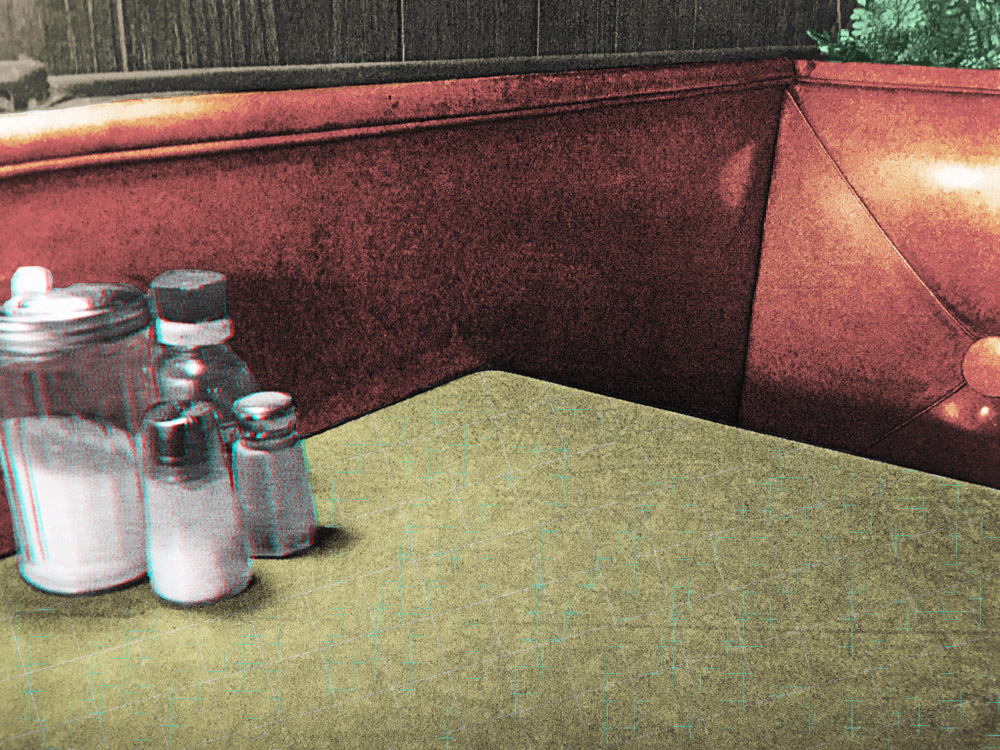[996 words]
I knew when he asked for more napkins, there might be trouble. I’m good at this. Hector, my boss, told me once that he totally relied on me for guest temper assessment. I should have been a shrink of some sort.
I delivered several layers of napkins, and guess what? He said, “That’s more than adequate.”
See what I’m saying. Trouble, right? I gave Hector my look that says “incoming,” a term I learned from an uncle who’d fought in Vietnam. He nodded and eyed my customer, already wiping his hands on his apron, preparing for the worst.
The air was electric, like when your boyfriend asks, “What’s for dinner” and you haven’t even thought about dinner because you haven’t made dinner for like a month. And you look at him and kind of smile and hope he smiles back. Electric, right?
The customer ordered the fish and chips, and it all seemed normal until I delivered the fish and chips and he asked for vinegar.
“Vinegar?” I said.
“Yes,” he said, “But if you don’t have it, well, that’s fine.”
“That’s fine?” I repeated. “Of course we have vinegar. What kind of thing is that to say?”
I threw another look at Hector, preparing for an 86. 86, I learned, is a code for booting disruptive customers. I scooted back to the kitchen and told Hector the guest suggested that we might not have vinegar. “What?” he said. “Why, that’s outrageous.”
“See,” I said.
Hector got me.
So now I was loaded, I mean prepared. I had learned how to handle troublesome customers from my mom, who booted my first dad when I was twelve because he kept being sarcastic or ironic – never really got the difference. For example, he once too many times said “that’s corny” when my mom served an ear of corn she’d slaved over.
“What’s that supposed to mean?” she finally said.
“It’s a joke, Helen.”
But she didn’t laugh. Another time, when my younger brother broke his arm falling off a skateboard, he said, “Guess you can’t skate through life.” That earned him a night on the couch.
Her second husband was also difficult. He loved to bring her flowers, but they were always the wrong color. After she got a promotion at the bank, he brought her a bouquet of yellow daffodils. He should have known better.
“Yellow? Yellow? Really?” she said.
Two years into their marriage, he threw a surprise party for her fiftieth birthday. She hated surprises, and though it wasn’t a raucous affair and only included her best friends and was professionally catered, the music was way too recent. Don’t blame her. Who wants to hear Taylor Swift when Depeche Mode is your all-time favorite?
She’s single now and enjoying her best life.
She taught me that you don’t need to put up with shit, and I don’t, nor does Hector.
When I returned to my fish and chips customer with the vinegar, I said, “It’s balsamic, is that okay?”
He picked up the bottle and examined the label, saying, “Top shelf.”
That did it. “Sir, I said, I’m going to have to ask you to leave.”
He seemed confused, but I think it was an act.
“Sorry, he said, “what’s the problem?”
“Top shelf. Really? Do you treat all your servers this way?”
I looked over at Hector who nodded at my decision, ready to escort the customer out.
“I mean,” he said, “that this is an excellent vinegar.”
“Now, I know you’re being sarcastic. Don’t worry about paying.”
“But…”
“Sir,” I said in an assertive way, pointing to the door he came in through.
Later, a woman came in with her two young kids, and I thought, “Whoo boy. Gonna be another rough day.”
The kids sat perfectly still, barely saying a thing. She gave each of them a menu, which seemed kinda odd to me. I never got to look at my own menu in a restaurant when I was their age. Don’t know any kids that did.
“Would you like some water?” I asked, and she said, “Why yes,” and then, get this, she looked over at her kids and asked them if they wanted water. They both shook their heads and said “No, thanks.”
“So, just the one water?” And she nodded.
I gestured to Hector when I got her water, letting him know he should be on alert.
They all ordered burgers, which always come with fries, but the little girl asked her mother, “Do they have salads?”
Mind you, she didn’t ask me as though I wasn’t even standing there.
“Yes, we have salads,” I said and wanting to say, “Who doesn’t have salads?”
This day was turning out to be as annoying as a flock of mosquitoes.
“Dressing?” I asked the woman, who looked at her daughter.
“Do they have Ranch?” again directed at her mother.
That was it. I had to say something.
“She can ask me as I’m standing right here.”
The woman laughed a little and said, “They’ve been taught not to talk to strangers, maybe taught too well. You can answer Sarah.”
“Do you have Ranch?” she asked.
“Taught too well,” I repeated. “Yes, we have Ranch.”
“Taught too well.” Imagine. As I put in the order with Hector, I asked if I could take a break, and he nodded.
I stepped out back and sparked up my vape, shaking my head and wondering what’s wrong with the world? There’s a nice group of high trees behind the café, and I watched some sparrows having the time of their life, not bad mouthing anyone, just getting on with their day. I guess I kind of got caught up in the beauty of it all and lost track of time because next thing I knew Hector was standing beside me. We shared a couple of hits on the vape.
“They left,” Hector said, and laughed.
“Yeah, well, good riddance.” It was nice and quiet after that.
Michael Smith’s work has appeared in several publications, including the Iowa Review, Seneca Review, Northwest Review, among others. His flash fiction story, “Bass Weather,” published by Gemini Magazine, was included in the 2017 edition of Best Short Fiction. He is the author of Writing Dangerous Poetry and Everyday Creative Writing: Panning for Gold in the Kitchen Sink (McGraw and Hill). He is a graduate of the MFA program from the University of Arizona and lives in Pomona, CA.
Image Credit




